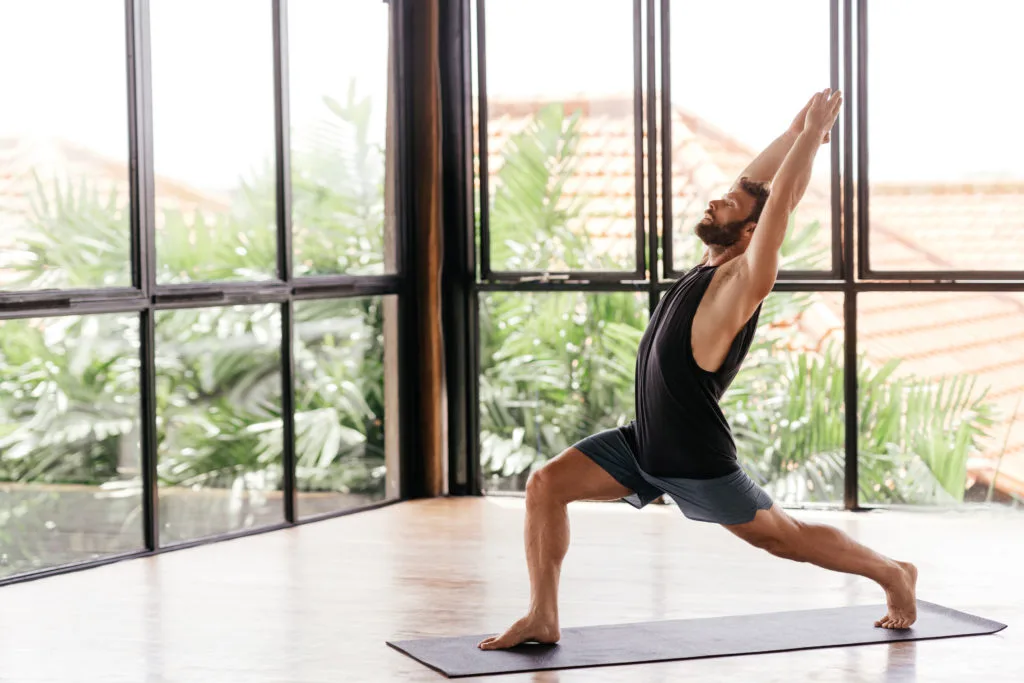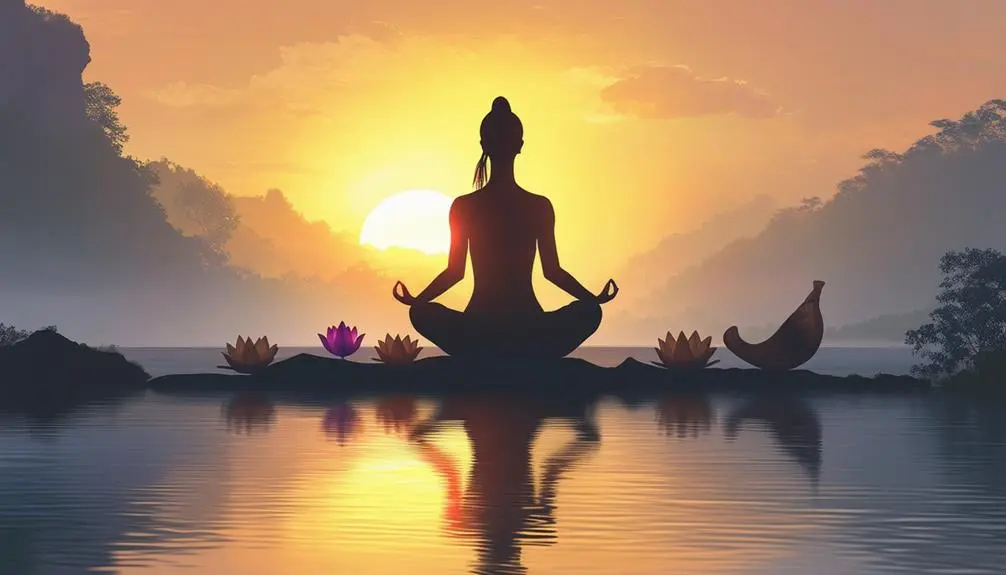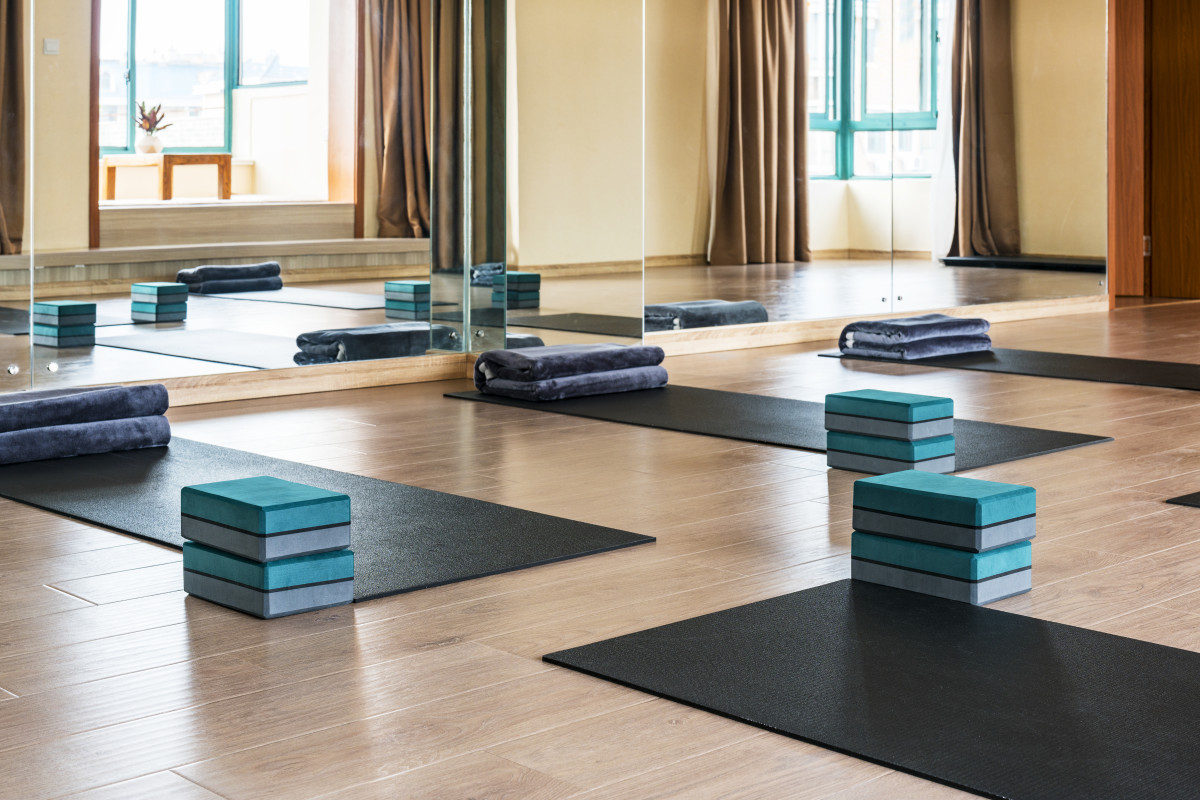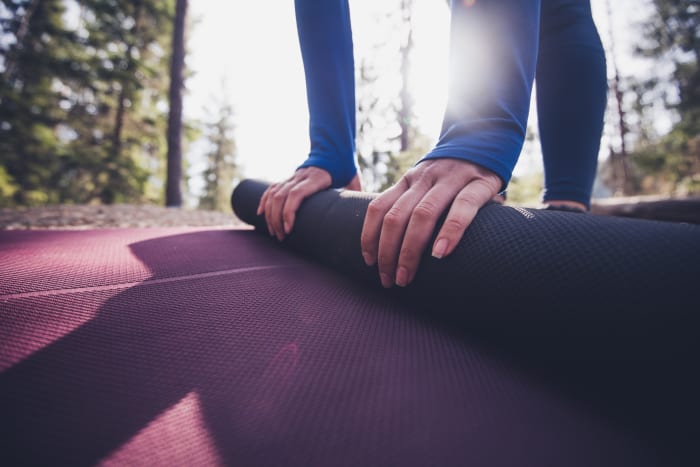In New York, where there are 11 confirmed cases of COVID-19, the disease caused by the novel coronavirus, Abhaya Yoga in Brooklyn ensured its students that they've increased the number of "deep cleanings" at the studio and are wiping down all surfaces with antibacterial wash twice a day. Teachers are washing their hands before and after class and using hand sanitizer (more than usual). And yoga mats—perhaps the dirtiest culprits of all—are now treated with stronger-than-usual antimicrobial agents.
Studio owners across the country are quickly putting policies in place requesting that students stay home if they're sick and give extra care to wiping down their props before they put them away.
See also Stressed About Coronavirus? Here's How Yoga Can Help
At my own home studio, Blue Lotus in Raleigh, I have decided to stop touching my students entirely, and have intentionally placed the hand sanitizer in a conspicuous place. Other uniquely yogic solutions are popping up too. Marla Broadfoot, a yoga practitioner and teacher in Wendell, North Carolina, consulted with her students earlier this week about whether to suspend her Savasana forehead massages, to which they said, “no way.” Instead, they suggested adding lavender or tea tree oil to prevent the spread of the virus. “Though I don't believe there is any evidence essential oils would be effective against coronavirus," notes Broadfoot.
See also The Ultimate Guide to Cleaning Your Yoga Mat
National Yoga Chains Take Precautions
Meanwhile, larger yoga studio chains are requiring safety protocols to protect students and teachers. The Denver-based yoga chain CorePower Yoga announced on Monday that it would reduce the use of props and hands-on assists in its classes around the country, and that "hospital-grade disinfectant sprays” would be used to clean equipment, according to an email obtained by FOX Business.
In an email from YogaWorks CEO Brian Cooper, students were recently reassured that the company was stepping up its measures to maintain the cleanliness and safety of its 66 facilities across the country—17 of which are in the Los Angeles area where a state of emergency was declared on Wednesday after a man died from the virus. "We have increased our professional cleaning schedules, have updated and increased our in-house cleaning by current staff to clean and sanitize frequently touched surfaces, props, and equipment multiple times a day, and are asking all staff and students to refrain from coming into the studios when ill," he wrote.
See also This Yoga Sequence Will Reduce Stress and Boost Immunity
Bad For Yoga Business?
When I followed up with Cooper to find out whether YogaWorks had observed a decline in student attendance in wake of the virus, he told me that the company had not seen any major financial or operational impact. “We’ll continue to monitor and always provide a safe and healthy environment for our teachers and students,” he said.
Anne Elyse Hartigan, owner of We Yoga Co in Seattle, Washington, where nine people have died (at press time) from the virus, says she’s seen a direct impact from all the hysteria in the area on both attendance and business.
But it's not just yoga studios that are responding to the outbreak, which has infected over 90,000 people around the world and killed over 3,000. Wanderlust Festival, which produces events in more than 20 countries across Asia, Europe, Australia and Latin America, announced on Tuesday that it would not continue with its 2020 events in the United States. CEO Sean Hoess explained that the move was an attempt to minimize disruption and harm before tickets went on sale and festival goers and talent were locked in to travel plans. Hoess says the festival’s venue partners took the worst hit from the decision. “Our events take months and months to plan and if we don’t go on sale now and wait two months, then it’s also too late,” he said by phone. “We got into a situation where the only responsible thing we thought to do would be to cancel.”
Last week, Wanderlust also canceled multiple planned events in several Asian countries due to the spread of coronavirus, which had a significant financial impact on the parent company here in the U.S., though Hoess says Wanderlust’s events in Europe will still go on as planned. In an email sent to Wanderlust subscribers on Tuesday, Hoess wrote that the festival’s global operations make the company especially "vulnerable to unusual and unexpected disruptions."
The decision to cancel the U.S. events, according to Hoess, did not have anything to do with any current location of the outbreaks of the virus so much as it did the unpredictability and uncertainty of where the virus will continue spread and how those ramifications could potentially affect large public gatherings like yoga festivals. If the outbreak were to become a pandemic in the U.S., would anyone even want to buy a ticket?
The Impact of Losing In-Person Yoga Experiences
In the meantime, Wanderlust plans to shift its focus to serving its community in the digital sphere—though Hoess admits there’s no real substitute for the human connection that exists within a festival experience. “We all have to face the reality that life may become a little different and people may be thinking differently about how they gather—there’s always opportunities to bring people together,” he said. Though he doesn’t expect to replace the physical experience with a digital one, Hoess says there has to be a way to create meaningful human interactions for wellness practitioners online.
In-person experiences in general appear to be on a steady decline, at least for now. Traveling teachers who rely on income from workshops and retreats have made tough decisions of their own this month. Kevin Lamb, an Anusara-trained teacher based in Brooklyn, recently postponed a retreat at Locando Del Gallo in Umbria, Italy, after the travel advisory reached a Level 3 status and the death toll from coronavirus had surpassed 100. “Signups were considerably less than previous years,” he told me in an email. “While I’m certain the coronavirus contributed to that I cannot say it was the only factor—I will say I have been leading international retreats for over seven years now and this is the first one I’ve had to postpone.”
Yoga Medicine founder Tiffany Cruikshank recently postponed a retreat in Bali. "It was the toughest decision I’ve had to make," she told me in an email. "In all my years doing this I’ve never rescheduled a training." Cruikshank says that despite the implications the postponement will have on her business, it was the only way she could put the health and safety of her students and teachers first. "I know that most of our community are either healthcare providers or work in the healthcare industry or work with sick students, and so that added another layer of complication," she said. "It’s my goal first and foremost to support the hard work they do with their clients along their journey to health, rather than compromise it."
Santa Barbara-based Jivana Heyman, director of Accessible Yoga, recently postponed an upcoming training at in Tokyo, where the spread of coronavirus is mounting. Heyman says his hosts had advised him not to come because students were unlikely to sign up. He said the yoga scene there had been impacted in response to the closure of a hot studio that was suspected to have transmitted the virus.
"It's impacting my schedule because I plan at least a year in advance and teach all over the place," he said, adding that he's already seen lower enrollment in his trainings than usual in Kansas City, New York City, and New Haven, just within in the past month; offerings that typically have wait lists. "People are hesitant to book travel and then to spend time in a studio for a weekend," he said. "It’s a scary time and we don’t know what's going to happen next."
See also Change Your Stress Response
Heyman says that until recently, he’s been fortunate and his trainings have been lucrative. He said that reverting back to the uncertainty and unpredictability of “the unknown” is, in fact, quite normal for any yoga teacher. "This is my comfort zone," he said with a laugh.
Heyman specializes in training yoga teachers to work with people with disabilities and other sensitive populations that could be more susceptible to contracting the virus, such as senior citizens, hospital patients, and children. When asked how he might supplement his income should he continue to see a decline in attendance at his trainings, Heyman said that given the communities he's training teachers to serve, he's afraid there just isn't an effective way to replace in-person trainings with online ones.
"Community building in-person is just such a big part of yoga for me and I just can't let that go," he said. Heyman fears that increasing isolation could create a new problem, and compromise the mental and physical health and well-being of already vulnerable populations.
And many yoga professional would likely agree. The community aspect of a yoga experience is a top draw for any practitioner—and with so many smaller, independent studios struggling to stay afloat the last thing that any studio needs is a decline in student attendance. "There isn't anything that has made me feel uneasy about walking into a studio as a student," says teacher Broadfoot in North Carolina. “If anything, I feel like it helps me build up my armor for dealing with the uneasiness or anxieties of the outside world.”
Is your studio taking precautions to keep the place sanitized for students? Are you concerned about group fitness in general? We encourage you to keep practicing to keep your immune system healthy, and to consult this COVID-19 resource guide from Yoga Alliance for more safety tips.








